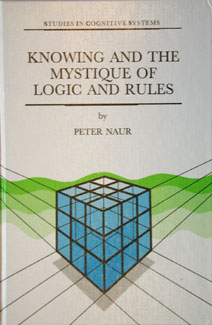

Knowing and the Mystique of Logic and Rules,
Kluwer Academic Publishers, xii + 365 pages, 1995. ISBN 0-7923-3680-1
| PART 1. | THE PSYCHOLOGY OF KNOWING |
| 1.1. | William James's Psychology of Knowing |
| 1.2. | Bertrand Russell on Knowing |
| 1.3. | J. L. Austin on How One Knows |
| 1.4. | Gilbert Ryle on Knowing |
| 1.5. | Summary on the Psychology of Knowing |
| PART 2. | LANGUAGE, OR KNOWING AND HUMAN EXPRESSION |
| 2.1. | Rules and Regularity in Language |
| 2.2. | Rules and Regularity in Musical Composition |
| 2.3. | Language Production and Understanding |
| 2.4. | True Statements in Knowing and Action |
| PART 3. | COMPUTING VERSUS HUMAN KNOWING |
| 3.1. | Three Notions of Proof |
| 3.2. | Proof Versus Formalization |
| 3.3. | Personal Style in Program Description and Understanding |
| 3.4. | Computer Modelling of Human Knowing Activity |
| PART 4. | SCHOLARSHIP AND SCIENCE |
| 4.1. | The Structure of DNA: Knowing in Biological Discovery |
| 4.2. | Why the Sun Shines: Coherence and Models in Scientific Description |
| 4.3. | Aberration in Special Relativity: A Case of Chronic Scientific Confusion |
| 4.4. | The Metaphysics of Constructed Models |
| 4.5. | Logic and Psychology of the Scientific Activity |
| 4.6. | Coherent Description as the Core of Scholarship and Science |
| REFERENCES | |
| INDEX |